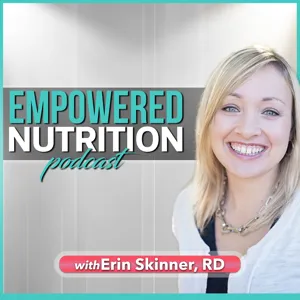Podcast Summary
Exploring the Health Benefits of Fiber: Fiber is a vital nutrient for digestion, blood sugar regulation, cholesterol reduction, and gut health. Incorporate it through whole foods for optimal health benefits.
Fiber, often thought of as just aiding in digestion, is a dietary superhero with numerous health benefits. This carbohydrate, found naturally in plants, not only helps regulate blood sugar levels and lower cholesterol, but also acts as the primary food source for gut microbes, which play a critical role in overall health. During this episode of Life Kit, NPR's Maria Godoy and Marielle discuss the importance of fiber, how it works in the body, the best ways to incorporate it into your diet, and whether supplements are necessary. For those looking to host a celebratory brunch without breaking the bank, Whole Foods Market offers wallet-friendly finds like whole smoked Atlantic salmon, mini quiches, organic everything bagels, and more. Plus, visit the floral department for a beautiful bouquet to elevate your table setting. Fiber's benefits extend beyond just digestion, making it a crucial component of a balanced diet. By understanding its role and how to incorporate it effectively, you'll be on your way to optimizing your health and enjoying delicious, wallet-friendly meals.
Fiber is key to a healthy gut and diverse microbiome: Eating a diverse range of fiber-rich foods ensures a thriving gut microbiome, contributing to better health through prebiotics and probiotics
Diets rich in fiber, particularly prebiotic fiber, are essential for a healthy gut and overall well-being. Fiber acts as the primary food source for gut microbes, which play a crucial role in regulating health, from immunity and allergies to heart disease and mental health. The gut microbiome, a community of trillions of diverse microbes living in your large intestine, is influenced by the type and diversity of fiber in your diet. Each microbe requires different fibers to function optimally, much like a team of builders needing various tools. Eating a diverse range of fiber-rich foods ensures a thriving and diverse gut microbiome, leading to better health. Both prebiotics (fiber sources) and probiotics (live microorganisms) contribute to a healthy gut microbiome. Prebiotic fibers are specifically fermented by gut microbes to produce beneficial chemical messengers, while not all fibers are easily fermented but still offer health benefits.
Focus on plant-based foods for fiber: Increase daily fiber intake by eating a variety of plant-based foods like sweet potatoes, avocados, asparagus, artichokes, brown rice, lentils, beans, chia seeds, and frozen berries.
Consuming adequate fiber is crucial for maintaining regularity and overall digestive health. Despite common beliefs, not all plant-based foods are high in fiber, and many people fall short of the recommended daily intake. The daily fiber requirement is around 25 grams for women and 38 grams for men, but most Americans consume less than 16 grams a day. To increase fiber intake, focus on eating a variety of plant-based foods, such as sweet potatoes, avocados, asparagus, artichokes, brown rice, lentils, and beans. These foods are rich in fiber and are also affordable. A simple way to incorporate more fiber into your diet is by adding chia seeds to your meals or making smoothies with frozen berries. Remember, aim to "eat the rainbow" by including a wide range of colorful plant-based foods in your meals.
Eating a Variety of Plant-Based Foods for Optimal Fiber Intake: Consuming a diverse range of plant foods increases fiber intake, improves health, and provides added nutrients and phytonutrients. Soluble fiber slows digestion and lowers glucose and cholesterol, while insoluble fiber adds bulk and prevents constipation. Fiber supplements can be helpful but may not provide the same benefits as fiber from whole foods.
Focusing on consuming a variety of plant-based foods, such as fruits, vegetables, whole grains, legumes, and nuts and seeds, is an effective way for most people to increase their fiber intake and improve their overall health. Soluble fiber, which can dissolve in water, helps slow digestion, lower glucose and cholesterol levels, and can be found in foods like oats, lentils, and apples. Insoluble fiber, which doesn't dissolve in water, adds bulk to stool and helps prevent constipation, and can be found in foods like quinoa, brown rice, and kale. It's best to get fiber from a diverse range of plant foods, rather than relying on supplements, as fiber from whole foods comes with added nutrients and phytonutrients. While fiber supplements can be helpful if you're not getting enough fiber through your diet, they may not provide the same benefits as fiber from whole foods, as the fiber in supplements is often less complex and may not reach all the microbes in your gut. Eating fiber-rich plant foods, such as black bean soup or lentil soup, is a more effective and natural way to meet your daily fiber needs.
Gradually increase fiber intake to avoid discomfort: Start small when adding fiber, drink water, cook veggies without seeds, track problem foods, take a walk after meals, be mindful of sensitive fibers, and listen to LIFE KIT episodes for more tips.
Increasing fiber intake is important for overall health, but it should be done gradually to avoid digestive discomfort. If you're currently not consuming a lot of fiber, start by making small changes, such as replacing one serving of white bread with whole grain bread each week. Drinking plenty of water and cooking vegetables without skins or seeds can also help reduce gas and bloating. Keep track of which foods cause discomfort and adjust your diet accordingly. Taking a walk after meals can also help alleviate symptoms. Remember, moderation is key when incorporating more fiber into your diet. If you're particularly sensitive to certain fibers, like chia seeds, be mindful of your intake. Lastly, consider listening to the LIFE KIT episodes on handling constipation and weightlifting for additional health tips. For more information, visit npr.org/lifekit.
Explore Shopify for $1 a month: Test out Shopify's features and functionalities for a low cost, build an online store, and potentially reach a larger customer base
If you're considering starting an online business, signing up for a trial period with Shopify is a cost-effective way to get started. For just $1 a month, you can explore the features and functionalities of the platform and determine if it's the right fit for your business. Shopify offers a user-friendly interface, a wide range of integrations, and 24/7 customer support. By taking advantage of this offer, you can test out your business ideas, build your online store, and potentially reach a larger customer base without the upfront costs and long-term commitments often associated with traditional brick-and-mortar stores. So, if you're ready to take the leap into e-commerce, consider signing up for Shopify's $1 per month trial period at shopify.com/npr.




